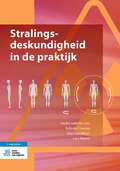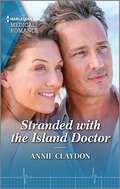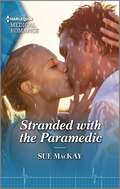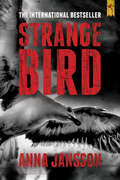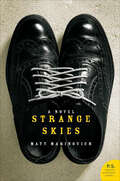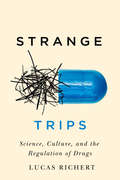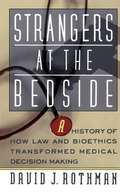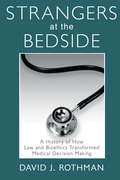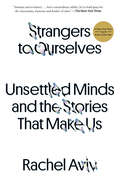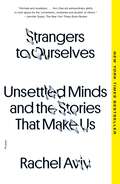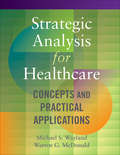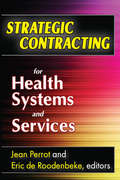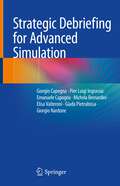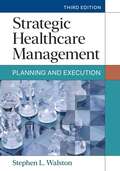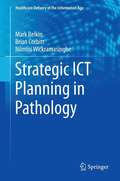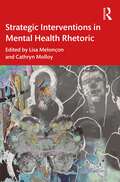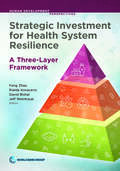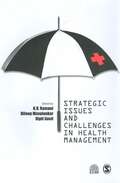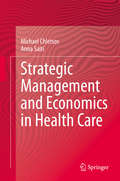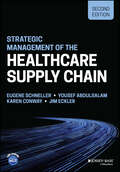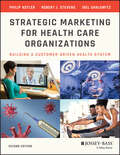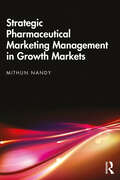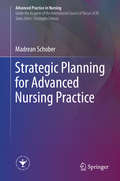- Table View
- List View
Stralingsdeskundigheid in de praktijk (Medische beeldvorming en radiotherapie)
by Relinde Croezen Stijn Laarakkers Lars MurrerDit is hét studieboek voor diverse opleidingen Toezichthoudend Medewerker Stralingsbescherming (TMS). Een compleet en begrijpelijk geschreven boek over stralingstoepassingen dat de opvolger is van zowel Fysica als Radiobiologie en stralingsbescherming. Gericht op de praktijk, to-the-point en met voldoende diepgang. Het boek is voorzien van alle recente informatie ten aanzien van stralingsbeschermingsgrootheden, wetswijzigingen en andere (internationale) ontwikkelingen. De focus ligt niet alleen op fysica maar ook op radiobiologie. Aan de orde komen: (ioniserende) straling, radioactiviteit, de wisselwerking van straling met materie en afscherming, dosimetrie, detectie, radiobiologie, inwendige besmetting, wetgeving, praktische stralingsbescherming en radiobiologie in de radiotherapie.Stralingsdeskundigheid in de praktijk maakt deel uit van de serie Medische beeldvorming en radiotherapie. Behalve als leerboek voor MBRT-studenten en MBB'ers (medisch beeldvormings- en bestralingsdeskundigen) in opleiding, is Stralingsdeskundigheid in de praktijk ook uitermate geschikt als naslagwerk voor hen die reeds die reeds werkzaam zijn in de praktijk van de radiologie, nucleaire geneeskunde en radiotherapie. Het boek bevat de nodige tools voor TMS medische toepassingen (MT), TMS verspreidbare radioactieve stoffen, niveau C (VRS-C) en TMS versnellers op niveau C (VER-C), en andere TMS-toepassingen en opleidingen.
Stranded with the Island Doctor
by Annie ClaydonIn Annie Claydon&’s captivating Harlequin Medical Romance, the heat is rising between two dedicated doctors on this beautiful tropical island! A storm is raging……between them! With her daughter now grown up and married, dedicated doctor Mel is finally taking some me time. Until a tropical storm interrupts her much-needed Maldives break. She doesn&’t hesitate to help. But working alongside the only other doctor on the island—insufferable yet handsome widower Rafe—isn&’t without its challenges. Especially when the tension between them turns into chemistry. Neither expected a second chance, but will that stop Mel from taking a leap of faith?From Harlequin Medical: Life and love in the world of modern medicine.
Stranded with the Paramedic
by Sue MacKayIn this latest Medical Romance by Sue MacKay, a paramedic and a doctor have no choice but to wait out a storm together when it hits. But can their moments of passion turn into forever?It started with a storm…Will it end in forever? Brooke Williams is taking control of her life. The only thing this paramedic can&’t control? The weather! So as her beachside break is struck by torrential rain, she finds herself helping injured residents alongside intriguing Doctor Danny Collins. Their chemistry is instant and soon they can&’t resist waiting out the storm—between the sheets! But Danny&’s holding something back and honesty is nonnegotiable for Brooke. Dare she risk her heart for a chance at happy-ever-after?From Harlequin Medical: Life and love in the world of modern medicine.
Strange Bird
by Paul Norlen Anna Jansson"Cold shivers run down my spine after reading just a few pages ..."-Göteborgs TidningenRuben Nilsson stepped outside into the dusk of a summer's evening, knocked his pipe against the veranda railing and looked around the garden. Had he known how short was the time he would be allowed to live, he might have been less leisurely.As the bird flu pandemic reaches Gotland Island, panic spreads among the inhabitants who are frantic for an elusive cure. In the desperation that rises, the hunt for scapegoats begins, and extremist and anti-immigrant groups gain ground. Meanwhile, nurse Sandra Hägg makes a gruesome discovery at the health clinic where she works-a discovery that will cost her life. Soon Detective Inspector Maria Wern is assigned to solve the murder. Strange Bird, the first novel in the Maria Wern series in English, showcases Jansson's mastery of both hair-raising crimes and the inner lives of her beloved characters.
Strange Skies: A Novel
by Matt MarinovichWhat kind of man would lie to his own wife about having cancer? A man desperate to avoid being saddled with life's responsibilities. A man like Paul.On a miserable October afternoon, as he stares down at his brother's whiny new baby, Paul realizes he's run out of excuses. His wife wants a family, but the last thing Paul wants is dirty diapers and a constantly screaming stranger robbing him of sleep. Then a lump is discovered on his arm, and with a little elaboration, the parenthood question is rendered moot.With the dwindling time he pretends he's got left, he intends to start looking out for number one. But his "cancer vacation" hits a snag when he meets a mother and son in an airport bar who turn everything around—and even bring Paul to the brink of a life he thought he never wanted—because sometimes a man's got to lose himself completely to discover who he really is.
Strange Trips: Science, Culture, and the Regulation of Drugs (McGill-Queen's/Associated Medical Services Studies in the History of Medicine, Health, and Society #51)
by Lucas RichertExamining the boundaries between recreational and medicinal drugs in the eyes of the public and the law.
Strangers at the Bedside: A History of How Law and Bioethics Transformed Medical Decision Making
by David J. RothmanWhat caused physicians in the USA to confront committees, forms, and active patients? Tracing the revolution that transformed the doctor-patient relationship, this book takes the reader into the laboratory and the examining room, tracing the development of new technologies and social attitudes.
Strangers at the Bedside: A History of How Law and Bioethics Transformed Medical Decision Making (Social Institutions And Social Change Ser.)
by David J. RothmanDavid Rothman gives us a brilliant, finely etched study of medical practice today. Beginning in the mid-1960s, the practice of medicine in the United States underwent a most remarkable--and thoroughly controversial--transformation. The discretion that the profession once enjoyed has been increasingly circumscribed, and now an almost bewildering number of parties and procedures participate in medical decision making.Well into the post-World War II period, decisions at the bedside were the almost exclusive concern of the individual physician, even when they raised fundamental ethical and social issues. It was mainly doctors who wrote and read about the morality of withholding a course of antibiotics and letting pneumonia serve as the old man's best friend, of considering a newborn with grave birth defects a "stillbirth" thus sparing the parents the agony of choice and the burden of care, of experimenting on the institutionalized the retarded to learn more about hepatitis, or of giving one patient and not another access to the iron lung when the machine was in short supply. Moreover, it was usually the individual physician who decided these matters without formal discussions with patients, their families, or even with colleagues, and certainly without drawing the attention of journalists, judges, or professional philosophers.The impact of the invasion of outsiders into medical decision-making, most generally framed, was to make the invisible visible. Outsiders to medicine--that is, lawyers, judges, legislators, and academics--have penetrated its every nook and cranny, in the process giving medicine exceptional prominence on the public agenda and making it the subject of popular discourse. The glare of the spotlight transformed medical decision making, shaping not merely the external conditions under which medicine would be practiced (something that the state, through the regulation of licensure, had always done), but the very substance of medical pract
Strangers to Ourselves: Unsettled Minds and the Stories That Make Us
by Rachel AvivThe highly anticipated debut from the acclaimed award-winning New Yorker writer Rachel Aviv compels us to examine how the stories we tell about mental illness shape our sense of who we are.Strangers to Ourselves poses fundamental questions about how we understand ourselves in periods of crisis and distress. Drawing on deep, original reporting as well as unpublished journals and memoirs, Rachel Aviv writes about people who have come up against the limits of psychiatric explanations for who they are. She follows an Indian woman celebrated as a saint who lives in healing temples in Kerala; an incarcerated mother vying for her children's forgiveness after recovering from psychosis; a man who devotes his life to seeking revenge upon his psychoanalysts; and an affluent young woman who, after a decade of defining herself through her diagnosis, decides to go off her meds because she doesn't know who she is without them. Animated by a profound sense of empathy, Aviv's gripping exploration is refracted through her own account of living in a hospital ward at the age of six and meeting a fellow patient with whom her life runs parallel—until it no longer does.Aviv asks how the stories we tell about mental disorders shape their course in our lives—and our identities, too. Challenging the way we understand and talk about illness, her account is a testament to the porousness and resilience of the mind.
Strangers to Ourselves: Unsettled Minds and the Stories That Make Us
by Rachel AvivOne of the top ten books of the year at The New York Times Book Review, The Wall Street Journal, Vulture/New York magazineA best book of the year at Los Angeles Times, Time, NPR, The Washington Post, Bookforum, The New Yorker, Vogue, KirkusThe acclaimed, award-winning New Yorker writer Rachel Aviv offers a groundbreaking exploration of mental illness and the mind, and illuminates the startling connections between diagnosis and identity.Strangers to Ourselves poses fundamental questions about how we understand ourselves in periods of crisis and distress. Drawing on deep, original reporting as well as unpublished journals and memoirs, Rachel Aviv writes about people who have come up against the limits of psychiatric explanations for who they are. She follows an Indian woman celebrated as a saint who lives in healing temples in Kerala; an incarcerated mother vying for her children’s forgiveness after recovering from psychosis; a man who devotes his life to seeking revenge upon his psychoanalysts; and an affluent young woman who, after a decade of defining herself through her diagnosis, decides to go off her meds because she doesn’t know who she is without them. Animated by a profound sense of empathy, Aviv’s gripping exploration is refracted through her own account of living in a hospital ward at the age of six and meeting a fellow patient with whom her life runs parallel—until it no longer does.Aviv asks how the stories we tell about mental disorders shape their course in our lives—and our identities, too. Challenging the way we understand and talk about illness, her account is a testament to the porousness and resilience of the mind.
Strategic Analysis for Healthcare Concepts and Practical Applications (AUPHA/HAP Book)
by Michael WaylandInstructor Resources: PowerPoint slides with teaching tips. An applied learning approach that will keep students engaged! The healthcare environment is changing rapidly, and so are the skill sets needed for successful organizational leadership in the field. Strategic Analysis for Healthcare: Concepts and Practical Applications arms readers with strategic analysis methods, tools, and frameworks, and builds a foundation of practical experience to prepare students for their future careers. This unique workbook introduces students to analysis and strategy development through examples within healthcare as well as from outside industries where strategic analysis has been key to organizations’ survival and success. After a brief introduction to business strategy, the book covers a sequence of strategic analysis tools, logically arranged into sections on broad analysis, focused analysis, integrative analysis, strategy development, and strategy selection. Application exercises grow in complexity from one chapter to the next as students develop new skills. Topics include the following: Future-perfect thinking and affinity charts Five forces, PEST, and SWOT analyses Financial statement and ratio analyses Life cycle and corporate culture analyses Internal–external and grand strategy matrices Quantitative strategic planning matrix and profitability projections The book can be used as a stand-alone text or in conjunction with existing textbooks to facilitate applied learning. Comprehensive yet practical, it can also be used in a capstone course. Perforated pages allow for easy use of the activities as gradable assignments.
Strategic Contracting for Health Systems and Services
by Eric de RoodenbekeUntil the start of the new century, efforts to strengthen health systems focused solely on the public sector and health programs overseen by public bodies. The private sector was sidelined in certain countries and even banned in others. At the same time, some private-sector stakeholders readily adapted themselves to this special situation so as to avoid becoming part of a structured health system.This volume notes profound changes in health care around the world in two areas. The stakeholders involved in the health sector are increasing in number and diversifying as a result of the development of the private sector. They are also responding to a process of democratization and decentralization. These developments have been paralleled by greater functional differentiation. Various stakeholders are increasingly specializing in particular areas of the health system: service delivery, procurement, management, financing, and regulation.The interdependence of health stakeholders becomes more evident along with the increased complexity of delivery systems as these respond to changing demand. There is a compelling need to forge relationships. Such relationships are in fact emerging in developed countries and, more recently, in developing countries. They may be informal, but are increasingly organized and structured.
Strategic Debriefing for Advanced Simulation
by Giorgio Capogna Giada Pietrabissa Giorgio Nardone Elisa Valteroni Pier Luigi Ingrassia Emanuele Capogna Michela BernardiniThis book provides an in-depth and complete guide explaining how to incorporate the strategic dialogue and strategic communication methods into the debriefing after the scenario, characteristics that make it unique. After examining all the aspects that allow a correct use of the simulation, such as knowledge of models, logical schemes, use of the different simulators, planning of the didactic activities and of learning process, this practical book aims to explore the advanced technique of the strategic debriefing. It encourages not only those who are approaching this new debriefing tool but also it provides a useful update to all those who are already more familiar with the standard debriefing after simulation technique.The strategic language, an effective tool in strategic psychotherapy and business problem solving, is ideal and complementary to the standard debriefing methods, making them more performing and functional because, next to common logic, it makes use of non-ordinary logical language. The book is intended for healthcare simulation debriefers and instructors, for hospitals’ managers, university teachers and to all the physicians who are increasingly showing interest in active teaching processes with simulation.
Strategic Healthcare Management: Planning and Execution
by Stephen L. WalstonDeveloping and implementing strategy is one of the most challenging tasks for healthcare leaders, as it requires a wide range of skills and knowledge. Strategic Healthcare Management: Planning and Execution provides a thorough overview of strategic principles and the competencies needed to apply them, such as communication, decision making, goal setting, data analyses, project management, and financial analysis. The book emphasizes both competitive and collaborative strategies to help healthcare leaders further their organization's mission rather than merely outperform competitors. <p><p>The third edition includes 10 brand-new cases and expanded content, including new chapters on: <p>• The growing trend of healthcare data analytics, with emphasis on data-driven strategic analysis <p>• Project management principles to support strategy implementation, with an exploration of tools and techniques such as Gantt charts.
Strategic ICT Planning in Pathology (Healthcare Delivery in the Information Age)
by Nilmini Wickramasinghe Markus Belkin Brian CorbittThere is little doubt that information technology is a major force in transforming healthcare systems: physicians need to have considerable patient data at hand, even if diagnosis and treatment are relatively straightforward. But data are only as useful as ICT--information communication technology--systems make them. Inefficient handling of data can quickly lead to chaos, and possibly to fatalities. Strategic ICT Planning in Pathology illuminates these problems, as well as their potential solutions, based on a unique body of research from Australia. Focusing on core strategic factors such as laboratory information systems capability and effectiveness, business-IT alignment, strategic spending, research and education, and end-user involvement, the book explains why pathology labs lag behind other hospital departments. Survey and focus group findings pinpoint the importance of Strategic Information System Planning (SISP), and its relationship to quality service delivery and an improved bottom line [ok?]. Among the topics covered: Approaches to SISP and IS effectiveness measurement. The OpenLabs project and pathology practice. Development of a framework for SISP. Focus groups: the view from the hospital laboratory, the private pathology lab, and the experts. Key findings and their implications for strategy, planning, and business outcomes. Future research directions, including reverse SISP. Strategic ICT Planning in Pathology is a go-to resource for healthcare administrators and researchers in healthcare management, health policy, and health services research interested in troubleshooting systems, conducting surveys on IS, or better understanding how quality ICT works.
Strategic Interventions in Mental Health Rhetoric
by Lisa MelonçonOffering rhetorically informed strategic interventions, this innovative collection moves beyond critiques of mental health issues, problems, and care. With sections that focus on methodological, cultural and legal, and pedagogical interventions, readers will find an engaging discussion of a discrete mental health phenomenon as well as a clear interventional takeaway in each chapter. Contributors make use of critical discourse analyses, ethnographic inquiries, autoethnographic inquiries, case studies, and textual analyses to engage such mental health research topics as postpartum depression among Chinese mothers; insanity pleas; anosognosia; issues of intimacy, access, and embodiment in research projects; community support groups; Black mental health; women in Alcoholics Anonymous; and mental health in faculty workshops and university online health tools. The authors and editors create scholarship on mental health that explicitly builds productive methodological, theoretical, and practical bridges among scholars and teachers in the various specialties of writing and communication. This collection will interest scholars, students, and practitioners in health and medical humanities; rhetoric of health and medicine; health communication; medical anthropology; scientific and technical communication; disability studies; and rhetorical studies generally.
Strategic Investment for Health System Resilience: A Three-Layer Framework (Human Development Perspectives)
by Feng Zhao, Rialda Kovacevic, David Bishai, and Jeff WeintraubAs efforts to build emergency-ready health systems intensify across the globe, Strategic Investment for Health System Resilience: A Three-Layer Framework provides a practical investment framework and a diverse set of country cases to inform decision-making and strategic resource allocations. The framework includes layer 1, risk reduction—promoting emergency-ready primary health care, public health, prevention, and community preparedness; layer 2, detection, containment, and mitigation capabilities; and layer 3, advanced case management and surge response. This three-layer framework prioritizes interventions that prevent a public health threat from developing in the first place (layer 1), limit its spread should one emerge (layer 2), and manage a widespread crisis that compromises a health system’s ability to deliver care sustainably (layer 3). All three layers play a role in achieving health system resilience, but not all of them have been leveraged equally in the past. Strategic Investment for Health System Resilience offers a glimpse of the relatively low cost of investments in improving the operation of the weakest parts of the three layers. Layer 1 functions are estimated to cost between US$2 per capita in low-income countries and US$4 per capita in lower-middle-income countries. The framework applies equally to short-term epidemics of communicable diseases and to slow-moving trends in noncommunicable diseases. The pace of the needed response to health threats can vary, but all require a system that is resilient across multiple layers of response. Although there is no universal blueprint for every setting, it behooves all countries to seize the moment and invest in the three layers in ways that fit their needs.
Strategic Issues and Challenges in Health Management
by K.V. Ramani, Dileep Mavalankar and Dipti GovilThe Indian health system has a poor global ranking. A new perspective on health system planning and development is required to improve the situation and build a health system responsive to the needs of the country. Strategic Issues and Challenges in Health Management addresses these concerns while also highlighting the challenges in delivering efficient and effective health services. The book discusses health sector reforms like financing, Public-Private Partnership (PPP), higher efficiency and cost-effectiveness. It deals with national health programmes, focusing on maternal and child health, infectious diseases, tuberculosis and malaria. The problems of urban health in the context of transition of the demographic and disease pattern in urban areas is also brought to the fore. Critical issues related to health and economic development, future challenges facing health systems, the policy challenges facing the implementation of the PPP approach, the issue of equity in health financing, as well as the roadblocks to efficient establishment of PPP are analysed. The book also deals with restructuring of the health system, while exploring capacity development as a process of health management. Written by well-known academics, health policy makers and health managers, this volume shall be of interest to health professionals, students and scholars of health economics, as well as those working in the areas of health and strategic management.
Strategic Management and Economics in Health Care
by Anna Saiti Michael ChletsosThis book offers significant managerial and economic knowledge on hospitals, and will serve as a valuable tool for explaining complicated managerial and economical problems, and for facilitating decision-making processes. It bridges management and economic sciences - two complementary sciences that feed the process of making rational decisions. With particular reference to the education, the main aim of this book is to provide students of relevant schools and departments with the knowledge (managerial and economic) that will enable them to deal both efficiently and effectively with the real problems arising in a health care organization such as a hospital. In particular, by equipping students with appropriate managerial and economic knowledge, the aim is to give them a clear understanding of HOW to deal with the diverse and complex problems of hospitals while at the same time helping them to develop strategic approaches that will make hospitals more efficient and sustainable.
Strategic Management of the Health Care Supply Chain
by Karen Conway Eugene Schneller Yousef Abdulsalam Jim EcklerA systems approach to understanding the needs of today’s healthcare supply chain Strategic Management of the Healthcare Supply Chain offers a big-picture overview and a proven strategic framework for supply chain management in healthcare. It also addresses concrete strategies for risk management, partnerships, logistics, performance assessment, information technology, and beyond. Readers will gain a comprehensive understanding of the issues facing the healthcare supply chain and the opportunities that present themselves as we look toward the future. Written by a team of authors with both research expertise and practical experience in healthcare supply chain, this broad and impactful book teases out the complexities within the supply chain field and the healthcare ecosystem. The healthcare industry is evolving rapidly, and the role of the supply chain is shifting in response. Institutions and practitioners are collaborating more closely than ever with supply chain leaders. This shift introduces new opportunities and challenges at the level of healthcare delivery. Additionally, the role of supply chain in safeguarding the social determinants of health—food, transportation, critical health-related products—is rapidly expanding, especially in historically underserved populations. This revised edition takes a holistic approach to the needs of people and organizations, yielding strategies that will improve both economic and health outcomes. Gain the understanding you need to work toward building a mature supply chain organization Develop perspective on how the needs of the healthcare supply chain are shifting in the modern era Holistically assess supply chain performance and improve clinical, financial, and operational outcomes Identify opportunities to generate value, improve alliances, and cut costsThis book will be of interest to graduate students in the health sector and supply chain programs, as well as working clinicians, health sector managers, and supply chain leaders. Policymakers looking to create a more resilient healthcare supply chain in the wake of COVID-19 will also find valuable insight inside.
Strategic Marketing For Health Care Organizations
by Philip Kotler Joel Shalowitz Robert J. StevensThis much-needed text offers an authoritative introduction to strategic marketing in health care and presents a wealth of ideas for gaining the competitive edge in the health care arena. Step by step the authors show how real companies build and implement effective strategies. It includes marketing approaches through a wide range of perspectives: hospitals, physician practices, social marketing, international health, managed care, pharmaceuticals, and biotechnology. With Strategic Marketing for Health Care Organizations, students and future administrators will have a guide to the most successful strategies and techniques, presented ready to apply by the most knowledgeable authors.
Strategic Marketing For Health Care Organizations: Building A Customer-Driven Health System
by Philip Kotler Robert J. Stevens Joel I. ShalowitzA thorough update to a best-selling text emphasizing how marketing solves a wide range of health care problems There has been an unmet need for a health care marketing text that focuses on solving real-world health care problems. The all new second edition of Strategic Marketing for Health Care Organizations meets this need by using an innovative approach supported by the authors’ deep academic, health management, and medical experience. Kotler, Stevens, and Shalowitz begin by establishing a foundation of marketing management principles. A stepwise approach is used to guide readers through the application of these marketing concepts to a physician marketing plan. The value of using environmental analysis to detect health care market opportunities and threats then follows. Readers are shown how secondary and primary marketing research is used to analyze environmental forces affecting a wide range of health care market participants. The heart of the book demonstrates how health management problems are solved using marketing tools and the latest available market data and information. Since the health care market is broad, heterogenous, and interconnected, it is important to have a comprehensive perspective. Individual chapters cover marketing for consumers, physicians, hospitals, health tech companies, biopharma companies, and social cause marketing – with strategies in this last chapter very relevant to the Covid-19 pandemic. Each chapter gives readers the opportunity to improve marketing problem-solving skills through discussion questions, case studies, and exercises.
Strategic Pharmaceutical Marketing Management in Growth Markets
by Mithun NandyIndia is the largest provider of generic drugs globally. The Indian pharmaceutical sector supplies over 50% of the global demand for various vaccines and, as a result, holds an important position in the global pharmaceutical sector. This book is a comprehensive study of pharmaceutical marketing management in the Indian context and similar growth markets. The book introduces the fast-paced and multi-faceted discipline of pharmaceutical marketing management through an in-depth discussion on the genesis and evolution of its marketing concept. Combining theory and practice, it offers a strategic approach to pharmaceutical marketing from an organizational and business perspective and explicates the practical applications of it. Richly supported by case studies, the book brings together fresh perspectives and approaches equally useful for students and professionals. This book will be of interest to academicians, advanced students, and practitioners of pharmaceutical marketing and pharmaceutical management. It will also be beneficial to those interested in business strategy, decision-making, and international marketing.
Strategic Planning for Advanced Nursing Practice
by Madrean SchoberThis eagerly anticipated book equips readers to understand the dynamics of policy processes, relevant decision-making and the significance of key decision-makers. It also emphasizes the usefulness of negotiation and diplomacy skills in order to support the development of an advanced nursing practice (ANP) initiative that involves the identification of pivotal issues to ensure that nurses unlock their full potential. Topics include a definition of strategic planning, essential factors to bear in mind, and frameworks to use in the context of formulating effective policies. By addressing outcome indicators and research, this volume offers a comprehensive approach to coordinated planning, and will appeal to advanced practice nurses, healthcare planners and policymakers, as well as administrators at hospitals and healthcare institutions.
Strategic Planning for Advanced Nursing Practice (Advanced Practice in Nursing)
by Madrean SchoberThis eagerly anticipated book equips readers to understand the dynamics of policy processes, relevant decision-making and the significance of key decision-makers. It also emphasizes the usefulness of negotiation and diplomacy skills in order to support the development of an advanced nursing practice (ANP) initiative that involves the identification of pivotal issues to ensure that nurses unlock their full potential. Topics include a definition of strategic planning, essential factors to bear in mind, and frameworks to use in the context of formulating effective policies. By addressing outcome indicators and research, this volume offers a comprehensive approach to coordinated planning, and will appeal to advanced practice nurses, healthcare planners and policymakers, as well as administrators at hospitals and healthcare institutions.
